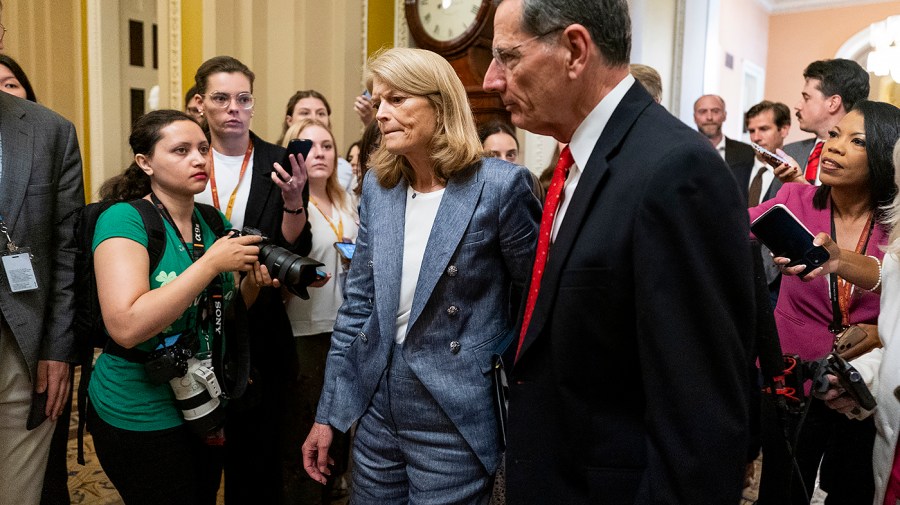Senate Passes Trump’s Megabill: Key Takeaways and Next Steps

Senate Republicans endured a grueling 26-hour session before passing President Trump’s ambitious tax and spending package early Tuesday afternoon. The bill, which aims to make permanent many of the 2017 tax cuts and implement significant changes to Medicaid, now heads to the House. There, it faces a tight deadline, with the GOP aiming for a July 4 passage.
The legislation marks a significant step forward for the Trump administration, promising to eliminate some taxes on tips and overtime while delivering the largest-ever cuts to Medicaid. As the bill moves across the Capitol, here are five key takeaways from the Senate’s version.
Thune Secures Legislative Victory
Senate Majority Leader John Thune (R-S.D.) achieved his first major legislative win since assuming leadership of the GOP conference. This victory bolsters his standing among Senate Republicans and President Trump, especially with more legislative battles on the horizon. Thune’s success is attributed to strategic changes he implemented, such as decentralizing power within the conference and empowering committee chairs.
Thune’s leadership was particularly evident in his negotiations with Sen. Lisa Murkowski (R-Alaska), which were pivotal in securing the bill’s passage. His ability to persuade and manage the diverse opinions within the Senate was crucial, as noted by Sen. Mike Rounds (R-S.D.), who praised Thune’s patience and strategic approach.
“He’s got patience that very few people are gifted with,” said Sen. Mike Rounds. “You can’t make anybody do anything. But what you can do is help them to get to a decision, and that’s what he’s doing.”
Murkowski Secures Key Concessions
Sen. Lisa Murkowski once again demonstrated her negotiating prowess by securing significant concessions for Alaska. These included a carve-out from changes to the Supplemental Nutrition Assistance Program (SNAP) and an increase in funding for a rural hospital fund. Although some provisions, like increased Medicaid payments, were not included in the final bill, Murkowski managed to secure additional benefits for her state.
Not everyone was pleased with the Alaska-specific inclusions, with some senators criticizing the concessions as costly. However, Murkowski defended her actions, emphasizing her responsibility to her constituents.
“My response is I have an obligation to the people of the state of Alaska, and I live up to that every single day,” Murkowski stated. “I fight for my state’s interests and make sure that Alaskans are understood.”
Political Risks for Republicans
The passage of the “big, beautiful bill” also highlighted the political risks for Republicans who oppose President Trump’s agenda. Sen. Thom Tillis (R-N.C.) announced he would not seek reelection after opposing Medicaid cuts in the package, illustrating the potential consequences of crossing Trump. This decision serves as a cautionary tale for other Republicans facing reelection.
Trump’s influence remains strong, as seen in his social media criticism of Tillis and his efforts to recruit a primary challenger. The situation underscores the delicate balance Republican senators must maintain between supporting Trump’s agenda and addressing their constituents’ concerns.
Challenges Ahead in the House
The Senate’s passage of the bill sets the stage for a challenging battle in the House. Speaker Mike Johnson (R-La.) faces opposition from at least six House GOP members who are prepared to vote against the Senate’s version. This resistance complicates efforts to meet the Independence Day deadline for the bill’s passage.
House Republicans are dissatisfied with the changes made by the Senate, with some expressing frustration over the bill’s perceived deterioration. The dynamics require Johnson, with Trump’s assistance, to navigate a difficult path to secure enough support for the bill.
“On the text chains, on the phone calls, everyone is complaining,” a moderate House Republican remarked. “There’s a few little provisions people will say something positive about, but no one is happy with the Senate version.”
Conservative Resistance and Future Implications
As the bill moves to the House, the question remains whether House conservatives will follow their Senate colleagues in ultimately supporting the legislation. Past experiences suggest that despite initial opposition, pressure from Trump could sway House conservatives to back the bill.
Rep. Ralph Norman (R-S.C.) and Rep. Chip Roy (R-Texas) have expressed strong reservations, yet acknowledge the pressure to align with the president’s agenda. The outcome in the House will be a critical test of Trump’s influence and the GOP’s ability to unify behind major legislative initiatives.
As the House prepares to tackle the bill, the stakes are high for both the Trump administration and the Republican Party. The outcome will not only impact the immediate legislative agenda but also shape the political landscape leading up to the next election cycle.






